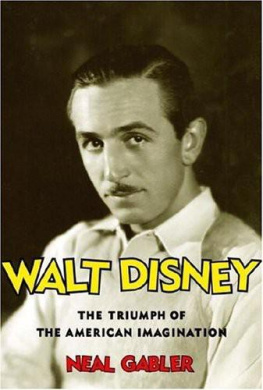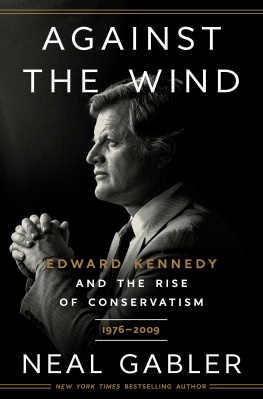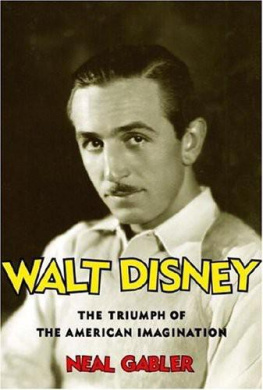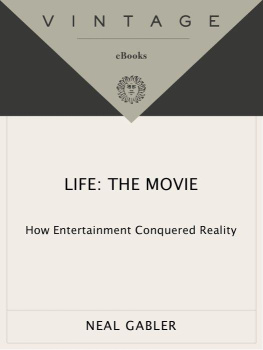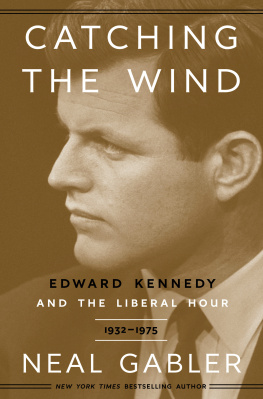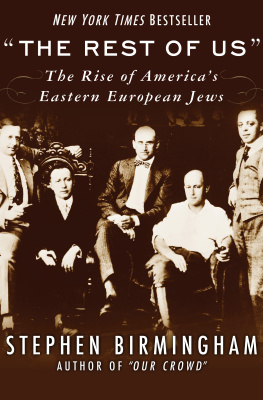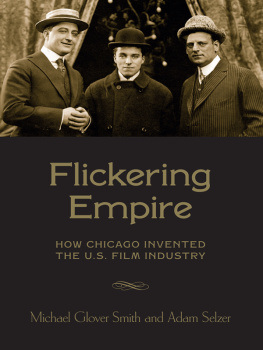Neal Gabler - An Empire of Their Own: How the Jews Invented Hollywood
Here you can read online Neal Gabler - An Empire of Their Own: How the Jews Invented Hollywood full text of the book (entire story) in english for free. Download pdf and epub, get meaning, cover and reviews about this ebook. year: 1989, publisher: Anchor, genre: Non-fiction. Description of the work, (preface) as well as reviews are available. Best literature library LitArk.com created for fans of good reading and offers a wide selection of genres:
Romance novel
Science fiction
Adventure
Detective
Science
History
Home and family
Prose
Art
Politics
Computer
Non-fiction
Religion
Business
Children
Humor
Choose a favorite category and find really read worthwhile books. Enjoy immersion in the world of imagination, feel the emotions of the characters or learn something new for yourself, make an fascinating discovery.

- Book:An Empire of Their Own: How the Jews Invented Hollywood
- Author:
- Publisher:Anchor
- Genre:
- Year:1989
- Rating:3 / 5
- Favourites:Add to favourites
- Your mark:
- 60
- 1
- 2
- 3
- 4
- 5
An Empire of Their Own: How the Jews Invented Hollywood: summary, description and annotation
We offer to read an annotation, description, summary or preface (depends on what the author of the book "An Empire of Their Own: How the Jews Invented Hollywood" wrote himself). If you haven't found the necessary information about the book — write in the comments, we will try to find it.
An Empire of Their Own: How the Jews Invented Hollywood — read online for free the complete book (whole text) full work
Below is the text of the book, divided by pages. System saving the place of the last page read, allows you to conveniently read the book "An Empire of Their Own: How the Jews Invented Hollywood" online for free, without having to search again every time where you left off. Put a bookmark, and you can go to the page where you finished reading at any time.
Font size:
Interval:
Bookmark:
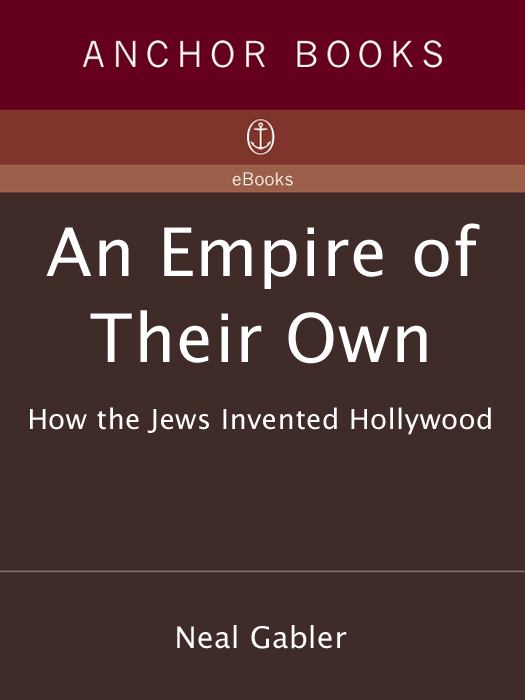
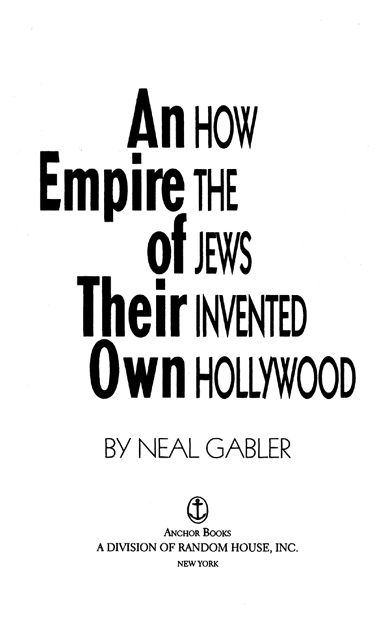
FIRST ANCHOR BOOKS EDITION, 1989
Copyright 1988 by Neal Gabler
All rights reserved under International and Pan-American Copyright Conventions. Published in the United States by Anchor Books, a division of Random House, Inc., New York, and simultaneously in Canada by Random House of Canada Limited, Toronto. Originally published in hardcover in the United States by Crown Publishers in 1988. The Anchor Books edition is published by arrangement with Crown Publishers, Inc.
Anchor Books and colophon are registered trademarks of Random House, Inc.
Acknowledgments for permission to use copyrighted material begin on .
Library of Congress Cataloging-in-Publication Data
Gabler, Neal.
An empire of their own: how the Jews invente Hollywood / by Neal Gabler. 1st Anchor books ed.
p. cm.
This book was originally published in hardcover by Crown Publishers, Inc. T.p. verso.
1. Motion picture industryCaliforniaLos
AngelesHistory. 2. Jews in the motion
picture industryUnited States. 3. Jewish
motion picture producers and directorsUnited
StatesBiography. I. Title.
[PN1993.5.U65G28 1989] 89-32940
384.80979494-dc20
eISBN: 978-0-307-77371-5
www.anchorbooks.com
v3.1_r1
To my beloved daughters, Laurel and Tanne,
And to all those who stand outside
the corridors of power and privilege
I want to give an all-fireworks
illumination of the intense
passion in Stahrs soul, his
love of life, his love for the
great thing hes built out here,
his, perhaps not exactly
satisfaction, but his feeling
certainly of coming home to
an empire of his ownan
empire he has made.
F. SCOTT FITZGERALD,
THE LAST TYCOON
Russian-Jewish immigrants came from the shtetls and ghettos out to Hollywood. In this magical place that had no relationship to any reality they had ever seen before in their lives, or that anyone else had ever seen, they decided to create their idea of an eastern aristocracy. The American Dreamis a Jewish invention.
JILL ROBINSON
They [the Jews of Hollywood] not only believed in the American Dream, rather than see it fail, they tried desperately and successfully to manufacture the evidence for its survival and for its existence.
HY KRAFT, SCREENWRITER
THIS BOOK BEGINS, AS HOLLYWOOD itself did, with something of a paradox. The paradox is that the American film industry, which Will Hays, president of the original Motion Picture Producers and Distributors of America, called the quintessence of what we mean by America, was founded and for more than thirty years operated by Eastern European Jews who themselves seemed to be anything but the quintessence of America. The much-vaunted studio system, which provided a prodigious supply of films during the movies heyday, was supervised by a second generation of Jews, many of whom also regarded themselves as marginal men trying to punch into the American mainstream. The storefront theaters of the late teens were transformed into the movie palaces of the twenties by Jewish exhibitors. And when sound movies commandeered the industry, Hollywood was invaded by a battalion of Jewish writers, mostly from the East. The most powerful talent agencies were run by Jews. Jewish lawyers transacted most of the industrys business and Jewish doctors ministered to the industrys sick. Above all, Jews produced the movies. Of 85 names engaged in production, a 1936 study noted, 53 are Jews. And the Jewish advantage holds in prestige as well as numbers. All of which led F. Scott Fitzgerald to characterize Hollywood carpingly as a Jewish holiday, a gentiles [sic] tragedy.
The real tragedy, however, was certainly the Jews. Their dominance became a target for wave after wave of vicious anti-Semitesfrom fire-and-brimstone evangelicals in the teens and early twenties who demanded the movies liberation from the hands of the devil and 500 un-Christian Jews to Red-baiters in the forties for whom Judaism was really a variety of communism and the movies their chief form of propaganda. The sum of this anti-Semitic demonology was that the Jews, by design or sheer ignorance, had used the movies to undermine traditional American values. As one antagonist put it, It is only because they [the Hollywood Jews] are outside the moral sphere of American culture that they blunder so badly that they require periodic campaigns such as that of the Legion of Decency [a Catholic reform group] to set them right. Ducking from these assaults, the Jews became the phantoms of the film history they had created, haunting it but never really able to inhabit it.
What deepened the pathos was that while the Hollywood Jews were being assailed by know-nothings for conspiring against traditional American values and the power structure that maintained them, they were desperately embracing those values and working to enter the power structure. Above all things, they wanted to be regarded as Americans, not Jews; they wanted to reinvent themselves here as new men. The movie Jews were acting out what Isaiah Berlin, in a similar context, had described as an over-intense admiration or indeed worship for the majority, a reverence that, Berlin also noted, sometimes oscillated with a latent resentment too, creating what he sympathetically called a neurotic distortion of the facts. Hollywood became both the vehicle for and the product of their distortions.
The Hollywood Jews, at least the first generation that built the industry and form the core of this book, were a remarkably homogeneous group with remarkably similar childhood experiences. The eldest, Carl Laemmle, was born in 1867 in Laupheim, a small village in southwestern Germany. His beloved mother died shortly after his thirteenth birthday, and he prevailed upon his father, a penurious land speculator, to let him come to America to seek his fortune. He would eventually found Universal Pictures.
Adolph Zukor was born in a small Hungarian village in the Tokay grape district. His father died while Adolph was in infancy, his mother a few years later, and Adolph was bundled off to an uncle nearby, a steely, bloodless rabbinical scholar. Lonely, independent, and unloved, Zukor, like Laemmle, petitioned to leave for America and a new life. He would later build Paramount Pictures.
William Fox was another Hungarian. In his case his parents were the emigrs, but his father was shiftless and irresponsible (William would spit on his coffin during the funeral), and the boy was forced to become an entrepreneur, hawking soda pop, sandwiches, and chimney black. He would parlay these experiences into the Fox Film Corporation.
Louis B. Mayer said that he had forgotten exactly where in Russia he had been born and on what day. (He would later appropriate the Fourth of July for his birthday.) He settled with his parents in maritime Canada, where his father established a junkyard and salvage operation. By his teens, Louis was bridling at his fathers authority, and he left for Boston, where he tried setting up a junk and salvage operation of his own. He would, of course, head the greatest studio of them all, Metro-Goldwyn-Mayer.
Benjamin Warner left his wife, son, and infant daughter in Poland while he followed relatives who had sought their fortune in America. After two years as a cobbler in Baltimore, he had earned enough to send for his family and promptly began increasing their number. For years, he roamed the East and Canada, peddling notions from a wagon, before finally settling in Youngstown, Ohio, and it was there his sons, Harry, Sam, Albert, and Jack, decided to pool their resources and buy a broken movie projector. The result was the eponymous company, Warner Brothers.
Font size:
Interval:
Bookmark:
Similar books «An Empire of Their Own: How the Jews Invented Hollywood»
Look at similar books to An Empire of Their Own: How the Jews Invented Hollywood. We have selected literature similar in name and meaning in the hope of providing readers with more options to find new, interesting, not yet read works.
Discussion, reviews of the book An Empire of Their Own: How the Jews Invented Hollywood and just readers' own opinions. Leave your comments, write what you think about the work, its meaning or the main characters. Specify what exactly you liked and what you didn't like, and why you think so.

